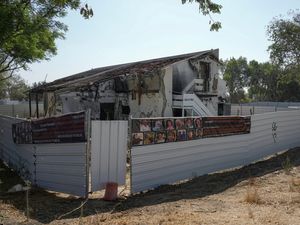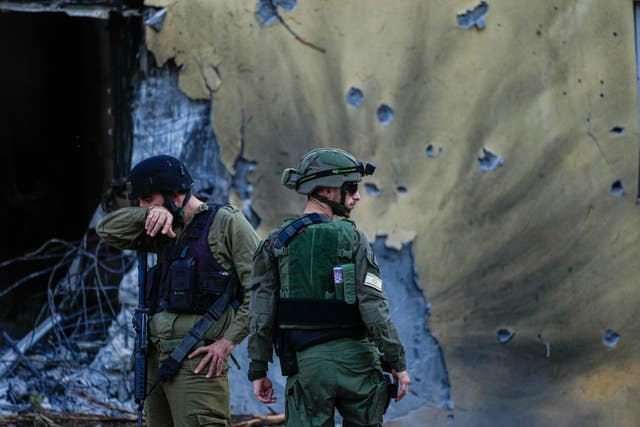Army acknowledges October 7 failures but says tank strike did not kill Israelis
Survivors said that during the stand-off a tank fired at the home, raising concerns that the 13 hostages inside were killed by friendly fire.

The Israeli military has said that hostages held in a home that was struck by tank fire on October 7 were likely killed by Hamas militants, and not shelling, as it released the results of its first investigation into failures during the deadly attack.
While the army appeared to clear itself in the tank strike, it acknowledged a string of errors that day in its core mission of protecting the country’s citizens, including slow response times and disorganisation during the standoff at Kibbutz Be’eri.
“The fighting in the area in the first hours was characterised by a lack of command and control and a lack of coordination and order between the various forces,” the report said.
“This caused a number of incidents in which security forces gathered at the entrance to the kibbutz and did not engage in immediate combat.”

Be’eri, located just several kilometres from the Gaza border, was among the hardest hit communities in the early morning Hamas attack, with more than 100 people killed and more than 30 others taken hostage.
It also was the scene of one of the most high-profile incidents of October 7 – a stand-off in which militants held a group of hostages inside a home.
Survivors said that during the stand-off a tank fired at the home, raising concerns that the 13 hostages inside were killed by friendly fire.
In its investigation, the army said the kibbutz was overrun by about 340 Hamas fighters and that militants killed most of the hostages, though it was unclear how it reached that conclusion, and the report called for additional tests.
Investigators “determined that, based on the information reviewed and to the best of their understanding, no civilians inside the building were harmed by tank shell fire”, the report concluded, though it said two Israeli civilians were hit by shrapnel outside the building. One of those civilians died, according to the man’s wife.
It also said its commanders on the scene had made “professional and responsible decisions” in ordering the tank strike. It said there had been a joint decision by various commanders after hearing gunshots around the house and militants saying they planned to kill the hostages and commit suicide.
Yet the report admitted widespread failures that day.
“The inquiry team determined that army failed in its mission to protect the residents of Kibbutz Be’eri,” it said.
“The bravery of the Be’eri residents and the members of the kibbutz’s civilian rapid response team is commendable and was crucial in stabilising the defensive line during the first hours of combat.”

The Israeli army has come under heavy criticism from Palestinians and human rights groups, who say its investigations rarely result in punishment.
Kibbutz residents gave the report a mixed reception, expressing anger over the army’s failures that day but also appreciation that it was taking responsibility.
Meir Zarbiv, a resident whose brother and sister were both killed on October 7, called the report a “deception” by the army. “I don’t believe the report and I don’t believe anything about it,” he said.
He said he still cannot understand why it took the army nearly four hours to arrive to the kibbutz, and then delay further at the front gate as soldiers waited for orders to enter.
“I just don’t believe what happened here. I have no explanation,” he said. “Where was the army?”
In a statement, the community called the investigation “thorough” and said it helped them understand the complexity of the fighting that day.
“We see great importance in the army accepting the blame and responsibility for its complete failure to protect us and in asking for forgiveness for abandoning us for many hours during an attack of unmatched evil,” it said.
The kibbutz also called for an official state commission of inquiry into the broader failures of October 7 “so the unimaginable loss we experienced will never against be experienced by any other citizen.”
The surprise cross-border raid killed some 1,200 people, most of them civilians, and took 250 others hostage, in the deadliest attack in Israel’s 76-year history.
The attack, in which several thousand militants stormed across the border without resistance, revealed grave shortcomings in the army’s readiness, its intelligence assessments and policies set by political leaders toward Gaza.
An Israeli offensive launched in response to the attack has killed more than 38,000 Palestinians, according to local health authorities, displaced over 80% of the territory’s people and triggered a humanitarian disaster in Gaza.
Israel is now facing war crimes and genocide allegations in international courts.
The army has launched multiple investigations into the failures of October 7, and the head of military intelligence has resigned. Several other commanders have apologised and taken responsibility for their failures.
But Prime Minister Benjamin Netanyahu has rejected repeated calls for an official state investigation, even as the war enters its 10th month.
Mr Netanyahu has said an investigation cannot be conducted while the country is focused on its war against Hamas and says all questions will be answered at the appropriate time.
But critics accuse the Israeli leader of dragging his feet to avoid what will almost certainly be harsh criticism of his policies and leadership.
In the face of fierce international criticism, Mr Netanyahu has vowed to continue the war until destroying Hamas’ military and governing capabilities and the roughly 120 hostages remaining in Gaza return home.
International mediators have launched renewed efforts to broker a ceasefire between Israel and Hamas.





